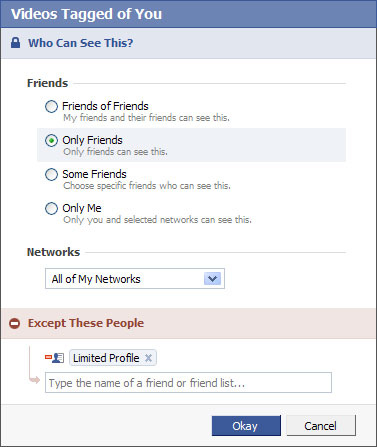Earlier this month, Facebook changed the way privacy settings work. In several posts across the web, people are talking about how the privacy changes actually limit how much Facebook users can keep private. If you’re curious about these changes, then check out ProfHacker’s “Managing Facebook Privacy Settings (Round 2),” digital inspiration’s “How to Cross-Check Your Facebook Privacy Settings,” the Electronic Frontier Foundations’s (EFF ) “Facebook’s New Privacy Changes: The Good, The Bad, and The Ugly,” or Gawker’s “The Facebook Privacy Settings You’ve Lost Forever.” (Personally speaking, it’s driving me crazy that I can no longer block updates about when I “like” a friend’s status. First of all, who cares to know that? Second of all, it’s cluttering up my profile. Third of all, that’s between me and the person I like. Ha, get it? 😉
What I find interesting is the way Facebook is trying to market this change. In “An Open Letter from Facebook Founder Mark Zuckerberg,” Zuckerberg states:
We’re adding something that many of you have asked for — the ability to control who sees each individual piece of content you create or upload.
I assume what he’s referring to here is the ability to put specific privacy setting for each thing posted. If you post a status, then yes, you can determine whether it gets posted to friends, friends of friends, or everyone. You can also choose to share with specific people or choose a major group and leave out certain people. I think that is cool; however, it seems a user cannot update automatic feeds like new friends or “liked” posts. A user can delete these things off their feed/wall/whatever-you-wanna-call-it one by one, but the user no longer has the ability to say, “No, don’t add that without my permission.”
More perplexing is when Zuckerberg says this:
We’ve worked hard to build controls that we think will be better for you, but we also understand that everyone’s needs are different. We’ll suggest settings for you based on your current level of privacy, but the best way for you to find the right settings is to read through all your options and customize them for yourself. I encourage you to do this and consider who you’re sharing with online.
Um, what? First off, I hate the idea of Facebook as this benevolent dictator, who’s only looking out for their users. If that were so, wouldn’t we be able to have control over the things we already had control over—rather than having that ability taken away?
Secondly, isn’t it a bit hypocritical to warn users about who they’re sharing content with when they can’t even control certain very important things about their profiles. For instance, a user can no longer block the kind of content that would be shared with a search engine. Previously, it was possible to block someone from seeing who your friends were, what pages you were a fan of, and your profile picture from search engines. You might have been listed in a Google search, but it’s possible not much was listed. Now, there’s the option of being listed or not. That’s it. Two choices. No more.
This, apparently, is in a move to make, as Zuckerberg says, “the world more open and connected.” Aw, isn’t that sweet? Facebook is gonna play psychologist and open us right up. The thought is nice. It’s nice in theory to think about being open and connected with the rest of the world—it really is, but merely taking away privacy controls is not going to make the world open and connected. People who wanted that privacy will just pull their content down. Moreover, Zuckerberg’s letter seems to ignore that those privacy controls will disappear. He concentrates more on the outdated network model and how changing that model will give more control to the user. Sure, I agree with getting rid of the networks, but that doesn’t mean that users have more control over their privacy settings. The two are not dependent upon each other. It’s kind of a shady look over here! (so, you don’t look over here) kinda move.
But, in the end, Facebook is a benevolent dictator. They make changes and Facebook users put up with it, adjust to it, and adapt, because they have to. At least, if they want to keep using that social network, then they have to. In this scenario, I’d say that most users probably didn’t take too much note. In my opinion, there are far too many people who are far too open and connected, so many probably didn’t even pay attention to the privacy settings when everything was first switched. And, in that case, they wouldn’t miss settings they never used. So, it’s not like Facebook or Zuckerberg would have had to do a lot of convincing for those audiences. The others, well, they’re the ones writing those articles at the top of this blog post and they don’t seem so convinced to me.




